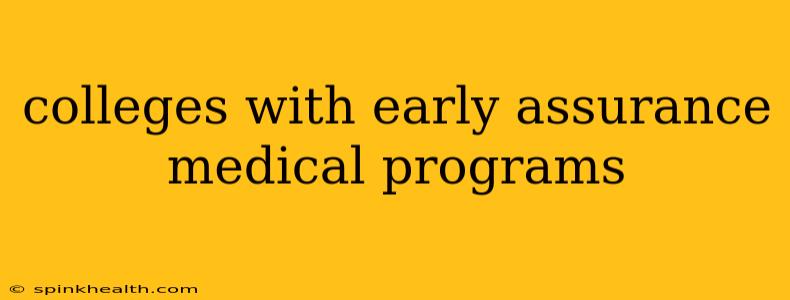The dream of becoming a doctor is a powerful one, fueled by a desire to heal, to serve, and to make a difference. For many aspiring physicians, the journey feels long and arduous, fraught with uncertainty. But what if there was a clearer, more direct path? That's where early assurance medical programs come in. These programs offer a lifeline, providing a guaranteed spot in medical school upon successful completion of an undergraduate degree. Let's dive into this exciting opportunity and explore the colleges that offer these coveted programs.
This isn't just about getting into medical school; it's about finding the right fit, the right environment to nurture your ambition and lay a strong foundation for your future career. The journey to becoming a physician starts long before you step into a medical school lecture hall. It begins with careful planning, dedication, and the right educational foundation.
What is an Early Assurance Medical Program?
Early assurance programs are partnerships between undergraduate colleges and medical schools. They offer highly motivated pre-med students a conditional acceptance into medical school upon meeting specific academic requirements and completing their undergraduate degree. This removes the stress and uncertainty of the traditional medical school application process, allowing students to focus on their studies and extracurricular activities. Think of it as a head start in a marathon.
How Do Early Assurance Programs Work?
These programs aren't a guaranteed ticket; they still require hard work and dedication. Students must maintain a high GPA, excel in specific science courses, score well on the MCAT, and often participate in relevant research or shadowing experiences. The specifics vary depending on the individual program. Think of it as a rigorous but supportive pathway designed for success.
What Are the Benefits of Early Assurance Programs?
The advantages are numerous:
- Reduced Stress: The pressure of the highly competitive medical school application process is significantly lessened.
- Focused Learning: Students can concentrate on their undergraduate studies without the constant worry of medical school applications.
- Mentorship and Support: Many programs provide dedicated advisors and mentors to guide students throughout their undergraduate and medical school journey.
- Early Exposure to Medical Field: Some programs offer opportunities for early exposure to the medical field through shadowing, research, or volunteer experiences.
Which Colleges Offer Early Assurance Medical Programs?
This is a question with many answers, as several institutions offer these pathways. Specific programs and their requirements vary significantly, so it's crucial to research individual program details. A general search online will reveal a range of options, and direct contact with the admissions offices of both the undergraduate and medical school is essential.
What are the Specific Requirements for Admission to Early Assurance Medical Programs?
This varies greatly between institutions and programs. However, expect to meet stringent requirements including:
- High GPA: Typically a 3.5 GPA or higher in challenging science coursework.
- Strong MCAT Score: Aiming for a high score is crucial, though the exact score requirement varies.
- Exceptional Letters of Recommendation: Showcasing your character, dedication, and potential.
- Meaningful Extracurricular Activities: Demonstrating commitment and well-roundedness.
- Research Experience (Often): Contributing to scientific research is highly beneficial.
- Clinical Experience (Sometimes): Shadowing doctors or working in clinical settings can boost your application.
Are There Disadvantages to Early Assurance Medical Programs?
While the advantages are many, there are some potential downsides to consider:
- Less Flexibility: Choosing an early assurance program limits your options for medical schools.
- Commitment: You are committing to a specific path early in your academic journey.
- Rigorous Requirements: The academic demands are high, requiring consistent effort and dedication.
How Competitive Are Early Assurance Medical Programs?
These programs are highly competitive, drawing many ambitious and qualified applicants. Success depends on a strong academic record, exceptional extracurricular activities, and a compelling personal statement.
What if I Don't Get Into an Early Assurance Program?
Don't despair! Many successful physicians haven't participated in these programs. The traditional medical school application process remains a viable and successful path.
Choosing the right path to becoming a doctor is a personal journey. Early assurance programs offer a structured and supportive route, but traditional applications remain a valid and successful alternative. Thorough research, careful planning, and a unwavering commitment to your goals are essential, regardless of the chosen path. The journey to becoming a physician is challenging but immensely rewarding. The right approach, tailored to your individual strengths and ambitions, will pave the way to success.

